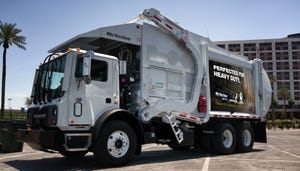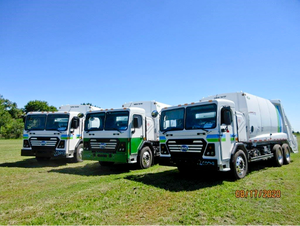Heating Up Food Waste
February 1, 2001
Bill Siuru
The concept researched at the University of British Columbia, Vancouver, Canada, seemed simple enough: convert food wastes into a high-energy and high-protein animal feed supplement. After all, food waste still is food.
This conversion required growing and harvesting a single cell protein in the form of thermophilic bacteria. In using this process, the researchers also found that municipal wastewater sludges, manure, and pulp and paper plant sludges could be converted into a nutrient-rich organic fertilizer additive or soil conditioner.
In 1987, Brampton, Ontario, Canada-based Thermo Tech Technology began developing this fermentation process for commercial use, and since 1994, has been operating three various sized plants that can convert 200 tons per day (tpd) up to 1,200 tpd. At these Thermo Master III plants, waste is processed into a thick, liquid slurry. Raw slurry undergoes a rapid, high-temperature fermentation that transforms it into a feed or fertilizer product while destroying pathogenic microbes.
The fermentation process relies on thermophilic (heat-loving) and aerobic (oxygen-loving) micro-organisms. After the fermentation stage, the end-product is dried, formed into pellets and ready to market to feed companies. Because the product is a commodity, prices vary but typically range from $180 per ton to $200 per ton.
Odors, which always are a concern at processing plants, are closely contained within the facility and are destroyed when process and ventilation air pass through a regenerative thermal oxidizer, which removes more than 99 percent of the odor-causing compounds, according to the company.
Thermo Tech also receives some of its income by processing the waste sludges generated from international companies such as Coca Cola Co., Atlanta, Kraft Foods Inc., Northfield, Ill., and Nestle, Glendale, Calif., which pay Thermo Tech to take their waste instead of sending it to a landfill. Thermo Tech also processes organic wastes supplied by supermarkets and restaurants.
While the company has plants in New York, Ontario, Canada, and a new facility planned for Detroit, it continues to seek new markets for its process. Plants are enclosed in a building of less than 30,000 square feet, and as a result, can be located in light- to medium- industrial-zoned areas, the company says.
Once a plant is licensed, Thermo Tech works with Planet Earth Recycling Inc. (PERI), Blaine, Washington, to help with engineering, construction, waste contracting and acquisitions. PERI, working with Total Recall Environmental Systems, Blaine, Washington, establishes contracts for delivery of raw materials, commodity brokering and other recycling technologies.
You May Also Like


